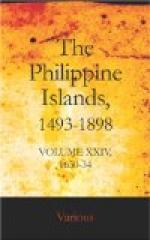15. Father Fray Juan de Sahagun, of Salamanca. He has held priorates, and has lived up to the measure of his strength.
16. Fray Francisco Figueroa, of Cordoba, a Pampanga missionary. He has carried himself well, and is esteemed and loved by all.
17. Father Fray Juan Ruiz, Bisayan missionary in the Bisayas for several years; and then our God took him to Himself.
18. This was father Fray Juan de Ocadiz, who was hanged for the murder of our father Fray Vicente. It would appear that that murder was needful to him for his salvation, for his penance during the entire time of his imprisonment was incredible. And his preparation for death was remarkable. It has been the Lord’s will to have given him His glory, since, to pardon one, He wishes repentance alone. Si autem impius egeret paenitentiam ab omnibus peccatis suis, quae operatus est ... omnium iniquitatum ejus, quae operatus est, non recordabor. [16]
When the violent murder of the provincial was divulged, an auditor went to [the fathers of] St. Augustine, by order of the royal Audiencia, to inquire into it. All the religious were assembled, and when all were in the hall of his Paternity, the auditor ordered all of them to kiss the hand of the dead provincial. On kissing it, father Fray Juan de Ocadiz began to tremble, etc., and confessed his guilt.
19. This was brother Fray Juan Bautista, a native of Genova, but a devoted servant of God, as he has proved in the time while he has lived in the Filipinas Islands, in the confidential offices that the order has entrusted to him. [17]
Our father visitor-general, seeing that many religious were necessary, and that very few were going to Manila, resolved to bestow some habits in the port of Acapulco. It served no other purpose than to bring to the table those who had to leave it next day, and to give a better passage to those who would have come exposed to the wretched lot endured by the soldiers; and, when they wish to give habits, there is no lack [of men] here in Manila. Therefore, scarcely were they come to Manila when they left. That year the first archbishop who has belonged to the islands sailed, namely, Don Pedro Vazquez de Mercado, a secular. He had been bishop in Nueva Espana, and, although any office there is better, accepted this office, as he had been reared in Filipinas (where he had enjoyed prebends and health), and because his Majesty ordered it.
No other order came then. The voyage was fortunate, for, without furling our sails, day or night, we reached Manila, June 6, 1610; and no voyage like ours has been made here since, as we sailed on March 25. Both vessels were very swift, the winds strong, and the rain-showers must have been a help.




